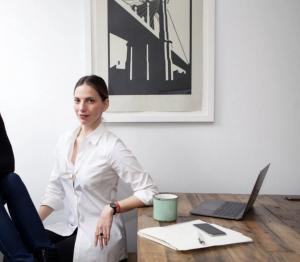Impostor Syndrome Wreaks Havoc on the Individual and Corporations Alike
Technology makes everything 'one click away' and is causing severe anxiety across the globe. Impostor syndrome causes more than second guessing ones self.
Feeling that one is a fraud, when it is unfounded, is one of many anxiety issues crushing individuals and companies in today's world. Mary Rinaldi, an NYC-based brand and product advisor, was recently interviewed by Candice Georgiadis on this subject, an excerpt below:
We would like to explore and flesh out the experience of Impostor Syndrome. How would you define Impostor Syndrome? What do people with Imposter Syndrome feel?
People with Imposter Syndrome feel a constant anxiety that despite repeated success and evidence of their competency, they are frauds. They feel a persistent anxiety that they’ll be caught out as imposters. It’s a very specific experience.
It’s been almost fifty years since clinical psychologists, Pauline Clance and Suzanne Imes, identified the condition and a lot has changed since.[1] As the stigma around mental health and wellness dissipates, the wealth gap continues to widen, and job security decreases, we’re all talking about Imposter Syndrome all the time, so I think it’s important to understand not only what it is, but also what it’s not:
Imposter Syndrome is not just an anxiety about professional ability or knowledge. We all contend with insecurities and inherently understand (whether we admit it or not) that many talented people could do a better job than us with our opportunity. We are under no illusions in 2019 that merit alone brought us our success, but that we have arrived where we are through privilege and an inherent inequality in our economic and societal system. But, we are still individuals with a personal experience and so we feel we must fight for our brilliance, our skills, and our accomplishments, because if we have no story of individual excellence to tell, what do we have? This is debilitating, but it’s not Imposter Syndrome.
Imposter Syndrome is also not the lack of self-worth or belief. Again, we go through discouragement, runs of bad luck, and unexpected challenges, which we can be tempted to interpret as a result of a character flaw or internal deficiency. It’s hard not to, since the vestiges of the American health and wealth gospel still crop up in our cultural storytelling — we’re taught progress is inevitable for those who truly believe in themselves. So what does it mean when we don’t progress? That we’re less worthy. Fighting this storyline is tough and essential, but it’s not Imposter Syndrome.
Imposter Syndrome is also not the world removing opportunities from our grasp because of our gender, race, sexuality, age, body or a combination of any. Being punished for existing as ourselves is oppression. It is dehumanizing and violent, but it’s not Imposter Syndrome.
When we talk about Imposter Syndrome, it’s important that we don’t unintentionally misappropriate language for other real experiences, like those named above. Catch the rest of the interview here.
Another individual interviewed by Candice Georgiadis, Dr. Florian Wegener, co-founder and CEO of ZAGENO, discusses the steps that one can take to push through this severely debilitating anxiety.
In your opinion, what are 5 steps that someone who is experiencing Impostor Syndrome can take to move forward despite feeling like an “Impostor”? Please share a story or an example for each.
Find a coach and talk about it. There is truth to the saying that a problem shared is a problem halved. Having a person with whom you can speak directly and demonstrate vulnerabilities that are not appropriate in a work setting can help provide a much-needed perspective.
Set small goals and achieve them. Even establishing a regular routine can be a professional win. Take the time to map out a number of goals that may not amount to much independently but that, taken as a group, will demonstrate clear progress.
Celebrate success. Enjoy the progress you’ve achieved with some kind of celebration. Hiring your next great sales executive may earn you a break from the normal grind to hit the gym or try that new lunch place around the corner from the office. Meanwhile, a new customer win could be cause for a more significant way to celebrate.
Meet your peers. Locate ways you can engage with other business leaders in a setting that’s interactive and organized around problem-solving. You’re likely to find that you’re not alone in the challenges that can feed impostor syndrome.
Set yourself a stretch goal. As you confidence grows so should your ambition. You may decide that you want to bring some media attention to yourself and your brand by pitching an idea to a journalist or submitting your company for a speaking opportunity or industry award. While these can be very hard to achieve they will help you suppress and mitigate feelings of inferiority. Get a better grasp on this issue by reading the rest of the interview here.
Bringing this anxiety to light via social media is helping corporations and individuals deal with it more readily, as those afflicted don't feel marginalized, while companies can get a better understanding of their employees. Strong interviews by Candice Georgiadis, on this and other topics, continues to help companies and individuals stand out in today's rapidly changing world.
About Candice Georgiadis
Candice Georgiadis is an active mother of three as well as a designer, founder, social media expert, and philanthropist. Candice Georgiadis is the founder and designer at CG & CO. She is also the Founder of the Social Media and Marketing Agency: Digital Agency. Candice Georgiadis is a Social Media influencer and contributing writer to ThriveGlobal, Authority Magazine and several others. In addition to her busy work life, Candice is a volunteer and donor to St Jude’s Children’s hospital.
Contact and information on how to follow Candice Georgiadis' latest interviews:
Website: http://candicegeorgiadis.com/
Email: CG@candicegeorgiadis.com
LinkedIn: https://www.linkedin.com/in/candice-georgiadis-34375b51/
Twitter: https://twitter.com/candigeorgiadis @candigeorgiadis
Candice georgiadis
candicegeorgiadis.com
+1 203-958-1234
email us here
Visit us on social media:
Twitter
LinkedIn
Legal Disclaimer:
EIN Presswire provides this news content "as is" without warranty of any kind. We do not accept any responsibility or liability for the accuracy, content, images, videos, licenses, completeness, legality, or reliability of the information contained in this article. If you have any complaints or copyright issues related to this article, kindly contact the author above.


